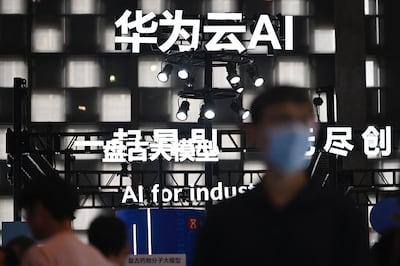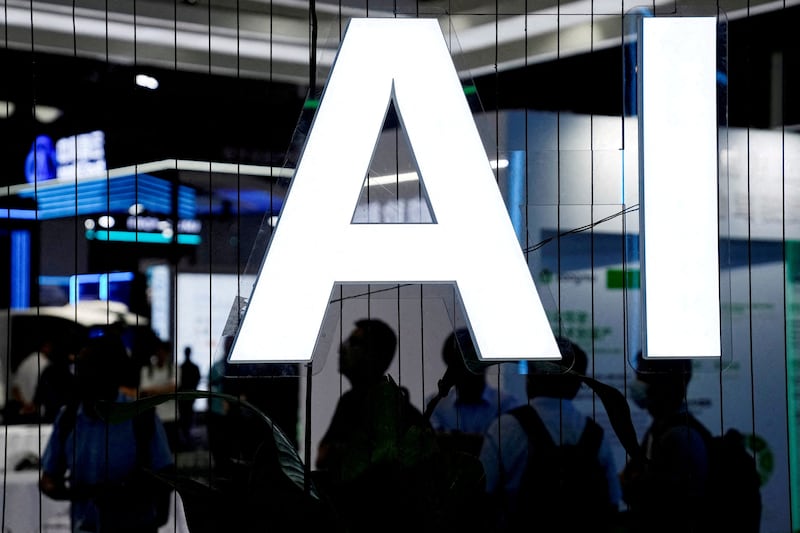The success of the first global summit on artificial intelligence, set to be hosted by Britain this autumn, rests largely on whether China will attend, a leading AI expert has told The National.
Prime Minister Rishi Sunak is attempting to spearhead an international coalition on AI safety amid warning from industry bosses that technology being developed could lead to many humans being killed if proper safeguards are not introduced.
His desire to place Britain at the forefront of the movement has been received well, but those with a stake in the gathering are holding their breath to see whether Beijing will be sent an invite.
The UK government has yet to announce a guest list or date for the meeting.
‘Don’t ignore China’
Professor Max Tegmark, a physicist and AI researcher at the Massachusetts Institute of Technology, said if a Chinese delegation are at the table the event has the potential to be a “turning point” for AI safety standards.
But he warned a snub from London could be perceived by Beijing as a murky plot by the West to use AI against its interests.
“If they do it without China it may make things worse in that it could make China feel that Britain and the West are trying to weaponise AI against it,” Prof Tegmark told The National.
“It’s great that the UK has taken this initiative because change really needs to happen at global level.”
Announcing the summit during a visit to the US in June, Mr Sunak said the time has come to instigate a “global effort” to make sure AI is “developed and used in a way that is safe and secure”.

Prof Tegmark, who cofounded the Future of Life Institute in 2014 to research and reduce risks posed by AI, said China is “limiting what AI can do” while the West stands idly by.
Rather than competing with the Chinese on the AI front, Britain, the US and their allies should look to join forces with the superpower, he added.
The researcher said the summit should have two main goals: to reach a joint communique from world leaders committing to improving AI safety to protect humans, and to recognise that working together in this area will benefit all nations.
Humans vs machines
Matt Clifford, an adviser to Mr Sunak, has said AI could reach an advanced stage where it could "kill many humans" if not kept under control.
AI technology that is being developed now could eventually become “more powerful than the US government” which would represent a direct threat to democracy, he warned.
“It’s obvious that if we can get it right the US, UK, China and other countries will dramatically get richer than they are today,” he explained.
“It’s important to remember that with future AI it will not be us vs them in terms of the East vs West. It will be us vs it, humans vs machines.
“AI has the potential to become the most dangerous thing ever. It’s going to become so powerful that this new technology will be a new species.
“We are going to have to make this safe or we could get wiped out.
“It’s important that Rishi Sunak really gets this. He may be one of the few world leaders who gets it, in which case it is awesome. But if he does not invite China I will withdraw this statement.
“I’m sure China would be happy to accept an invite.”
'Address dangerous rise in deepfakes'
Robert Pritchard, director of The Cyber Security Expert, a consultancy firm based in the West Midlands in England, said the current climate will provide much subject matter for the discussions, pointing to the rise in deepfakes.
This type of AI is used to create convincing images, audio or video hoaxes.
Politicians and celebrities have fallen victim to such technology.
DeepMedia, an American start-up that detects fake media online, estimated that 500,000 video and voice deepfakes would be shared on social media sites around the world in 2023.
The Electoral Commission, Britain’s electoral watchdog, issued a warning earlier this year saying current laws preventing political disinformation were “very old and really need to be updated”.
Mr Pritchard said highlighted the “dangerous” rise of deepfake technology and its spread on social media.
Online platforms are already being used by scammers to defraud people on a mammoth level, he said, and the government has yet to get on top of the problem.
He said fraud needs to be tackled head on in the current climate, instead of policymakers waiting for technological advancements to exacerbate the problem.
“It is foolish to think that AI advancements could cause online fraud to grow into a exponential problem because it already is a problem,” he told The National.
“I would like the government to have a specific focus on cyber fraud. We don’t do a particularly good job of clamping down on international gangs and organised crime.
“I think fraud should be in focus but I don’t think it needs special focus because of AI.”
The lack of certainty around the timing of the summit is reported to have irked Britain’s allies.
Oliver Dowden, the UK’s deputy prime minister, initially said a date in December had been earmarked. But multiple reports suggested it will be held in November.
A spokesman for the UK government said the details of the AI summit were still being finalised.
In a statement, the government said the event will bring together “key countries, as well as leading technology companies and researchers, to drive targeted, rapid international action and to build on developing the regulatory guardrails we need for the safe and responsible development of AI.”
“Our AI White Paper sets out a proportionate and adaptable approach to AI regulation to support its responsible development and deployment in the UK, as well as ensuring the right guardrails are in place to address any risks that may arise. We’ll set out further details on the summit due course.”
The UK published its AI White Paper in March, outlining its vision to adapt to the fast-moving developments of artificial intelligencein a strategy based on five principles including safety, transparency and fairness.
Britain’s AI industry contributed £3.7 billion to the economy and employed 50,000 people in 2022.







